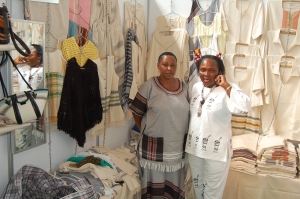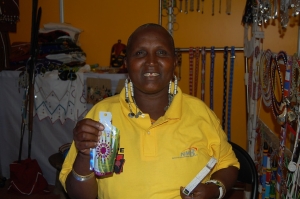Yesterday I introduced Flotea one of our textile producers . Flotea had left me with so much to think about and I when went to sleep that night I wondered what the next day would be like as I was due to meet Elihaika who is also a textile producer for Ethnic Supplies.

Elihaika (on the right)
Elihaika set up her Textile business in 2004 and initially designed clothing for the local market. Like other textile producers in Tanzania, she wanted access to a much wider market so she joined local groups and through these she got into large exhibitions and managed to access markets in nearby countries.
Today she works with 500 other women and is the team leader of Hand Products Of Tanzania (HOT) a group made up of 35 female entrepreneurs from Kenya, Tanzania and Uganda. Her role is to promote the work of the group and to ensure that they have access to public funding to enable them to participate in high profile events. Some of the group’s members such as Julia are semi or illiterate and rely on her for issues such as pricing

Julia
I told Elihaika about my conversation with Omari and asked about what life is like for women in Tanzania.
Elihaika: some are financially dependent some are not: where a woman has independent income she has control over it and it gives her spending power whilst those without financial independence are always asking their husbands for money and there is no guarantee that they will get it or that it will meet their needs. If a man is in charge of the money chances are arguments will arise, men don’t like it when women ask them for money and find this irritating and despise women that ask them for money constantly this in turn frustrates the woman as the woman as she doesn’t want to ask money but has no choice.
Are there Systems and processes in place to support women to become economically independent?
Elihaika: things are changing even in the rural areas, land is more accessible to women and the government is keen for women to own property. It is however up to the women to take advantage of the opportunities that have been provided. For instance family/marital property can pass to women banks have become accessible to women, micro finance is available too and if women take up these opportunities up then they can become financially independent. Women have a big role in economic development as they participate in production, create jobs and are responsible for children especially in the area of education. This (education) is important as it is the key role eradicating poverty.
With that in mind what are the challenges women in Tanzania face?
Elihaika:
- Access to working capital is still an issue for women without formal education.
- For those involved in textile production market access is a problem
- Access to overseas markets
- help with designing of products that are suitable for foreign markets
- African customs and culture, still place men on pedestals, where women are meant to be subservient, there are still areas that believe in certain jobs being unsuitable for girls
- property rights for women are still restricted in some parts even with the government legislation -girls can’t inherit property and confined to a life of poverty
- exclusion from education
- lack of control on household income and have not say how this is spent
I gave some thought to these challenges and naively or not I concluded that with a great deal of WILL and commitment almost all of them can be eliminated. It also seemed to me that women must strive for financial independence and one way that we can all help is to give women the tools they need to develop the skills that they require to take advantage of the initiatives created by governments and donors. But how do we get around the issue of market access especially access to overseas markets?
We probably can’t do much about the culture that places men on pedestals at the expense of women in Africa but if women gain financial independence an element of that culture may fade out on its own.
I left Tanzania the next day and head to Uganda. I will be writing about my experiences there in the next post. As usual it you have a view either way, I would love to hear from you.

